NIO’s 150-degree battery can run for 1044 kilometers, so feel free to drive. However, NIO’s top management has indicated that this 150-degree battery is likely to be available for lease only, as the cost is too high. Lei Jun revealed that Xiaomi’s first car has attracted 3400 engineers, with a total R&D investment of over 10 billion, and everyone is very excited. Domestic fuel prices have achieved “six consecutive declines”, so fuel car owners remember to refuel quickly. After the Gansu earthquake, several car companies quickly took action to support the disaster area, they are all commendable. What other hot topics are you interested in? Let’s review the hot topics on Weibo last week together.
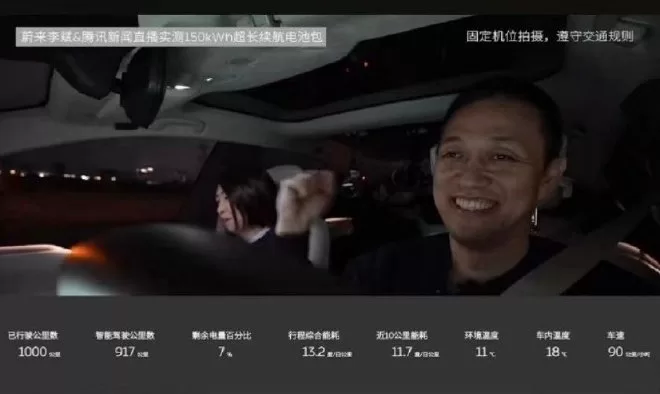
Event Recap: On December 17th, NIO’s founder, chairman, and CEO, William Li, drove the ET7 with a 150-degree ultra-long-range battery pack. After over 14 hours of driving, the battery was able to travel over 1000 kilometers. The average energy consumption for the entire 1044 kilometer journey was 13.2kWh per 100 kilometers, with 3% battery remaining, estimated to be able to travel over 30 kilometers.
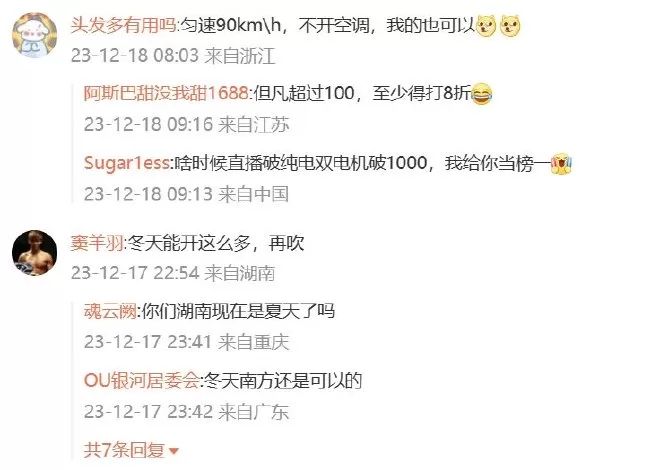
The NIO 150-degree battery pack released by Li Bin at the 2021 NIO Day finally “landed” today. The test results are particularly satisfactory. The range of over 1000 kilometers once again confirms that solid-state batteries are the best choice for new energy vehicles in the future. It is not difficult to see that as competition in the field of new energy vehicles heats up, power batteries will be everyone’s “ace in the hole” and “last resort” in the future. During the live test, Li Bin stated that the NIO 150-degree battery pack is the most advanced in global production battery packs, and the announcement and testing of the vehicle model have been completed. The mass production phase will begin soon, and it will be delivered to users in the near future. NIO’s 150-degree battery pack uses a semi-solid hybrid electrolyte, which, although not a full solid-state battery, still represents a visible improvement compared to previous liquid lithium-ion batteries. It currently has the highest energy density for both cell and pack in global production, at 360Wh/kg and 260Wh/kg respectively, surpassing Contemporary Amperex Technology’s (CATL) Kirin battery. There are definitely many people who still have various doubts, but don’t rush to express your opinions. It is normal to have doubts, and it is completely understandable. Just imagine, in the future, new energy vehicles will definitely gradually popularize this kind of long-range battery. But what about the price? Will it keep rising? Consumers have to be clear about where their money is going in the end. Is it worth it?
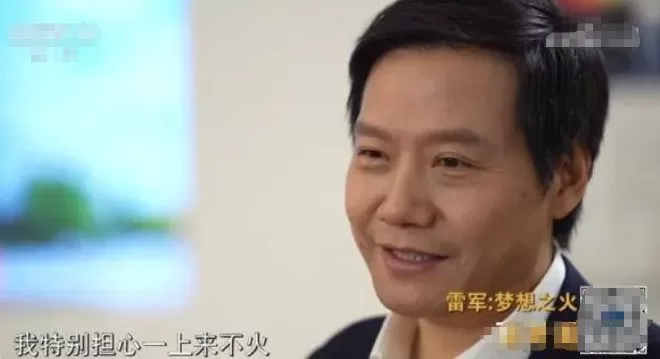
Recently, Xiaomi Chairman Lei Jun said in an interview that he believes Xiaomi has natural advantages in making cars, as the essence of smart electric cars is the integration of the automotive industry and the consumer electronics industry, a great fusion. Entering the automotive industry is challenging for Xiaomi, but the overall difficulty is manageable. Lei Jun also stated, “We have invested more than 100 billion in the development of the first car, involving 3,400 engineers, which is more than 10 times the investment.”
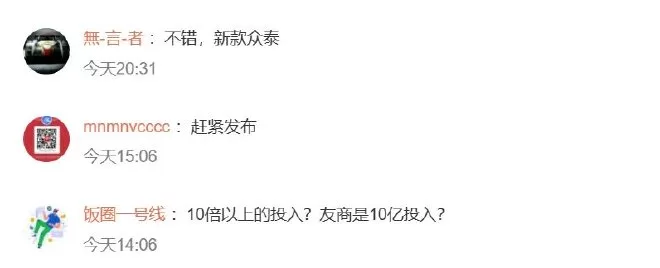
Lei Jun once again faced the questioning from the outside world calmly. His response was direct, stating that Xiaomi has many natural advantages in making cars. He believes there are challenges, but the overall difficulty is manageable. These remarks may not be considered bold, but they undoubtedly show Xiaomi’s confidence and control.
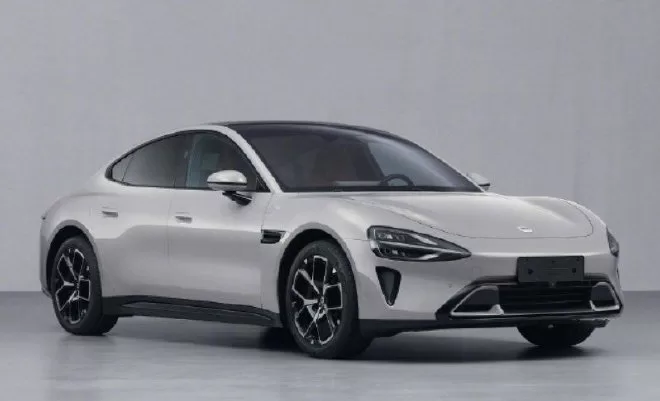
If Lei Jun dares to underestimate this industry, it must be wrong. Many people want to see him make mistakes, but at least not yet. Lei Jun claimed that three years ago he thought making cars was “quite difficult” and had enough awe for it, so he set the principle of “staying true and being extraordinary”, fully respecting the rules of the automotive industry, using mature industry technology to ensure the first car is well made, and then innovating on this basis. Xiaomi’s car is definitely a latecomer, can it come out on top? This is closely related to the commander’s strategic planning and layout. Lei Jun not only has “staying true and being extraordinary”, but also values research and development and investment. Lei Jun has adopted a “tenfold investment” strategy. He gave an example, a general car company invests 300 to 400 people and 1 to 2 billion yuan in funds to produce a car, while Xiaomi’s first car invested a total of 3,400 engineers and over 10 billion yuan in R&D expenses, which is “more than ten times the investment”. Leaving aside whether his examples are accurate, the level of attention Xiaomi’s car gives can be seen from the scale, and it really is not faking it. Faced with the current economic situation, is Xiaomi’s high R&D and high investment too risky? Lei Jun’s view is that the higher the investment in difficult situations, the easier it is to produce results, and it is also preparing for the entire market to recover. This inevitably brings to mind BYD’s experience mentioned by Wang Chuanfu at the 5 millionth car offline ceremony this year, “the most difficult thing that cannot be shaken is research and continuous investment”. Perhaps the truth is in their hands. In addition, when talking about future sales, Lei Jun also expressed his concern about the sales of Xiaomi’s cars, mainly worrying, “one is that it’s not popular, and no one buys it,” and another is worrying that “everyone wants to buy it, but has to wait one or two years”. Xiaomi’s car is very close to its final listing, and there must still be many questions. Let’s see what surprises Xiaomi’s car can bring us when it finally goes public, and the answer may be hidden within.

In December 2023, Zhiji Auto’s vehicle equipped with L3 level autonomous driving function officially obtained the high-speed road autonomous driving test license in Shanghai. In the future, Zhiji Auto will conduct L3 high-speed road autonomous driving road tests in designated areas under the supervision and guidance of the Shanghai government to accelerate the development and implementation of advanced intelligent driving products to meet the demand for advanced intelligent driving cars from users.
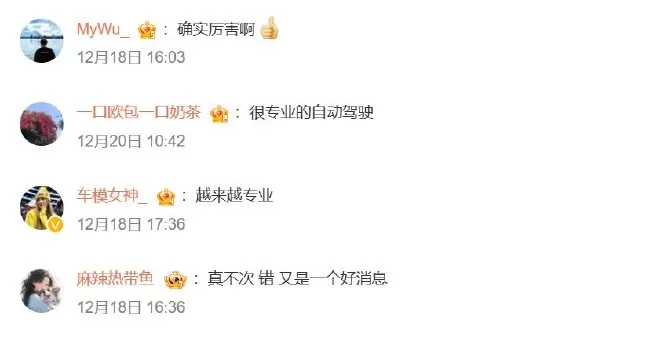
Zhiji has shown great confidence, leading the development of L3 level autonomous driving. At the same time, Zhiji’s IM AD high-speed and elevated NOA in cities have made breakthrough progress, striving to become a leader in the industry with the characteristics of “fast iteration, good experience, and safer.” Starting from December 12th, Zhiji’s IM AD high-speed NOA has officially covered the entire country, radiating to high-speed sections in 333 cities and covering elevated sections in 59 cities, with a total road length of 389,000 kilometers.
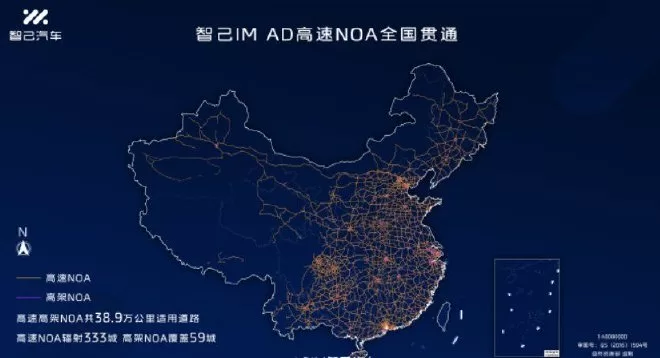
Since the official start of public testing in April this year, the high-speed NOA has been fully connected nationwide by December; IM AD high-speed elevated NOA has undergone seven rounds of public testing, taking 8 months, setting a record for the fastest landing speed of intelligent driving products in the industry. In addition, IM AD urban NOA is also steadily advancing. The actual test video shows that IM AD urban NOA has overcome three major urban NOA difficult scenarios: unprotected left turn at busy intersections, complex urban roundabout scenarios, and unprotected U-turn at busy intersections. According to the plan, IM AD urban NOA will start public testing for users in Shanghai as scheduled by the end of 2023, and will be gradually rolled out before the Spring Festival, opening first in the Shanghai area. After that, the urban commuting mode beta version will be launched in mid-2024; within 2024, the commuting mode will cover 100 cities nationwide. #Car companies support Gansu# Reading volume: 2.168 million Event review: At 23:59 on December 18th, a 6.2-magnitude earthquake occurred in Jishishan County, Linxia Prefecture, Gansu, and the disaster has touched the hearts of people across the country. Up to now, many car companies have donated to the disaster area. Netizens’ hot discussion:

Natural disasters are unpredictable. In a critical moment, various car companies have shown great selfless love, once again highlighting a strong sense of social responsibility. Let us pray for the disaster-stricken areas together and rebuild their beautiful homes as soon as possible. As of the afternoon of December 20th, it is understood that several car companies, including NIO, Geely, Chery, Great Wall, BMW, Mercedes-Benz, Li Auto, BYD, and Lantu Automobile, have announced donations to the earthquake-stricken areas in Gansu and Qinghai. NIO announced on the evening of December 19th through its official WeChat account that it has decided to join forces with NIO User Trust to donate a total of 5 million yuan to support the earthquake-stricken areas, while the NIO User Public Welfare Foundation is also formulating a plan for the affected areas. “NIO quickly mobilized, with NIO headquarters and Lanzhou company, NIO Lanzhou car club working together to mobilize resources to support the disaster-stricken areas.”
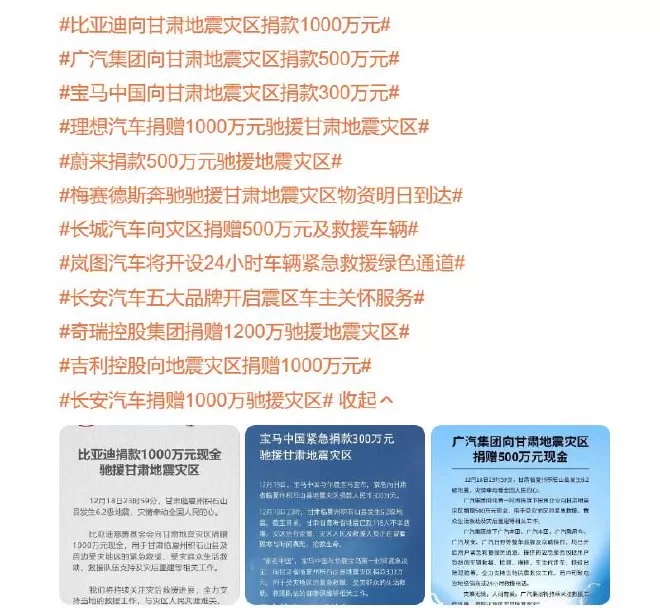
Chery Automobile also announced a donation of 12 million yuan to the earthquake-stricken areas of Gansu and Qinghai for emergency rescue, resettlement of the masses, and post-disaster reconstruction. “The company will fully support local relief and post-disaster recovery services, continue to pay attention to the progress of rescue work, and join hands with all sectors of society to help the people in the disaster area through difficult times,” Chery Automobile said. On December 20th, Geely Holding Group announced that it will donate 10 million yuan to the earthquake-stricken areas of Gansu and Qinghai in cooperation with the Li Shufu Public Welfare Foundation. “The funds will be used to purchase emergency relief supplies for the earthquake-stricken areas of Gansu and Qinghai, support post-disaster reconstruction work, and continue to pay attention to the rescue situation, and continue to contribute to the disaster relief, reconstruction, and safe winter for the affected people.” “The company has contacted the local charity association and learned that some materials are urgently needed in the disaster area. We have urgently provided materials such as four-person inflatable tents, self-inflating double air mattresses, outdoor drag carts, instant noodles, quilts, and medicines. They have been sent to Jishishan County by special vehicle authorized by the official material donation recipient,” said LanTu Automobile. Changan Automobile Group announced that from now until January 20, 2024, the group’s five major brands, Changan Automobile, Shenlan Automobile, Avita, Changan Auchan, and Changan Kaicheng, will jointly carry out owner care services for owners affected by the earthquake in Gansu and Qinghai provinces. This includes 24-hour rescue, professional assistance in insurance claims, and free in-car testing.
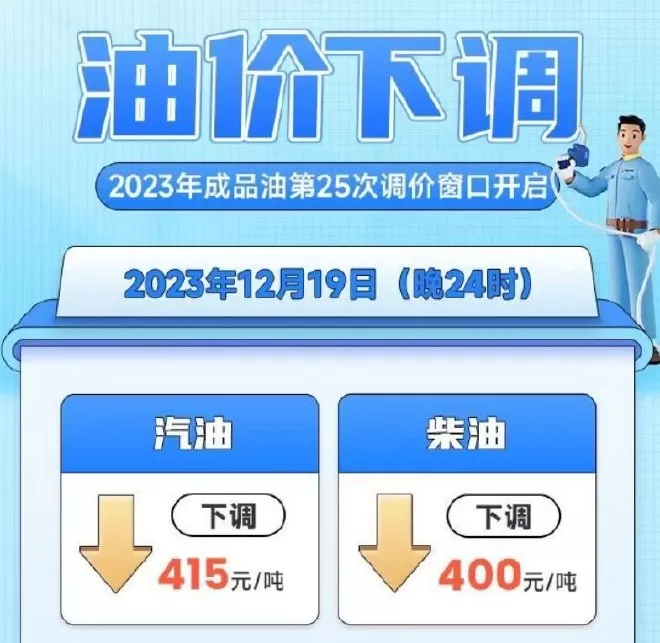
At 24:00 on December 19th, domestic refined oil will usher in a time window for price adjustment, which is also the last oil price adjustment in 2023. Gasoline and diesel will be reduced by 415 yuan (60$) and 400 yuan (60$) per ton respectively, and the ex-factory prices of 92# gasoline, 95# gasoline, and 0# diesel will be reduced by 0.34 yuan (0$), 0.36 yuan (10$), and 0.35 yuan (0$) respectively.
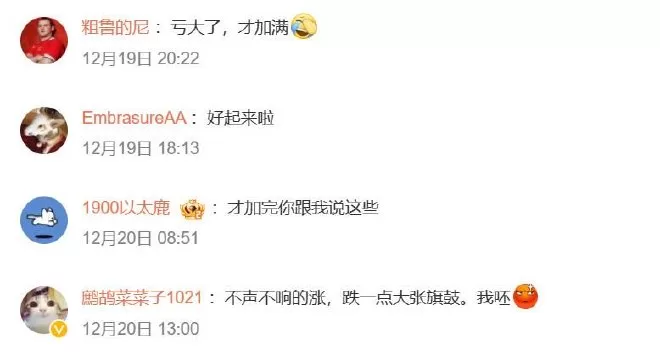
Oil prices have dropped again, undoubtedly the happiest news for fuel car owners. With this price drop, the domestic refined oil prices have experienced “six consecutive declines” this year, with a total of 25 rounds of price adjustments, showing a pattern of “10 increases, 12 decreases, and 3 standstills” throughout the year. In addition, the relevant person in charge of the Price Monitoring Center of the National Development and Reform Commission predicts that in the short term, international oil prices will continue to fluctuate. On the one hand, the lack of confidence in the economic growth prospects in the market will continue to put pressure on international oil prices; on the other hand, the recent series of attacks on oil tankers and other ships in the Red Sea will also restrain the downward space of international oil prices due to the geopolitical situation in the Middle East. According to media reports, Japan is a testing ground for BYD to evaluate its ability to expand in overseas markets. Several dealers revealed that after entering the Japanese market in January this year, BYD’s goal is to sell 30,000 electric vehicles in the country annually by 2025.

BYD’s new energy vehicle sales are not only the highest in China, but also now rank first in global sales. In the third quarter, sales of new energy vehicles reached 2.0796 million, a year-on-year increase of 76.23%. In the third quarter, BYD’s new energy vehicle sales reached 824,000, a year-on-year increase of 52.96%. BYD’s goal is to sell 30,000 electric vehicles annually in Japan by 2025. The plan is to establish a network of 100 dealers by 2025, meaning each dealer will sell 300 cars. However, this ambitious goal has also been questioned by the local media, as the Japanese automotive industry generally believes that dealers selling 200 cars per year are already far above the average level. As the saying goes, “know yourself and know your enemy, and you will never be defeated in a hundred battles.” The development of BYD’s overseas market naturally also depends on an understanding of local conditions and targeted sales policies. Atsuki Tofukuji, president of BYD’s Japanese sales subsidiary, is the former head of sales at a Japanese Volkswagen dealership, and has recruited many people with experience in selling imported cars to help BYD achieve this goal. We hope to see BYD achieve this sales target soon.
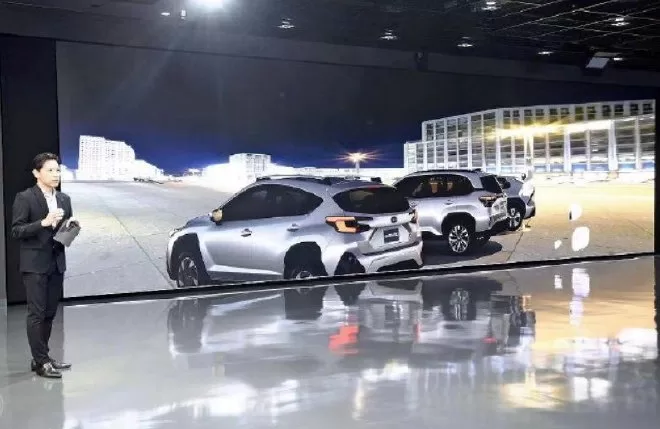
Event review: According to the Yomiuri Shimbun, Subaru has announced a new research and development base at its factory in Ota City, Gunma Prefecture, Japan, which will be operational next month. The new base aims to accelerate the development of electric cars, including a workshop specifically for collaborating with car parts manufacturers. Subaru says the factory’s operation is expected to cut the development time for electric cars in half compared to gasoline cars.
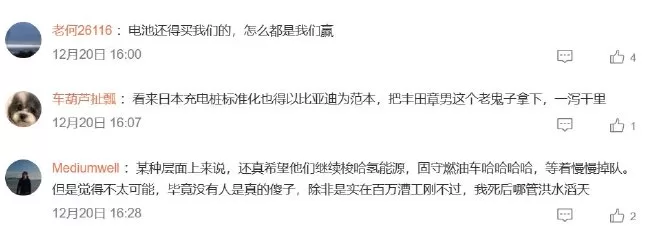
Subaru is investing about 30 billion yen in the construction of a seven-story facility, which is twice the size of the company’s headquarters, to show its focus on the future electrification. The CEO, Hiroshi Watahiki, says they will work with suppliers to speed up the development of electric cars. The new factory in Japan will produce electric cars and hybrids, with an expected total investment of about 250 billion yen, and Subaru aims to increase the sales share of electric and hybrid cars to over 40% by 2030. However, Subaru’s performance in the domestic market has not been outstanding, and it remains to be seen whether the new investment will help the company catch up with other carmakers in the new energy era.
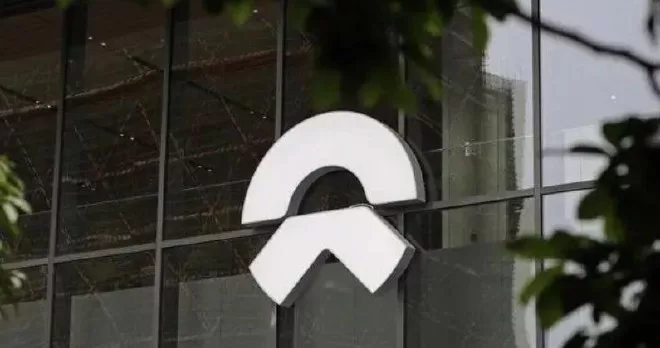
On December 18, NIO announced a new round of stock subscription agreement with Abu Dhabi investment firm CYVN Holdings. According to the agreement, CYVN Holdings will make a strategic investment of approximately $2.2 billion in cash through its subsidiary, CYVN Investments.
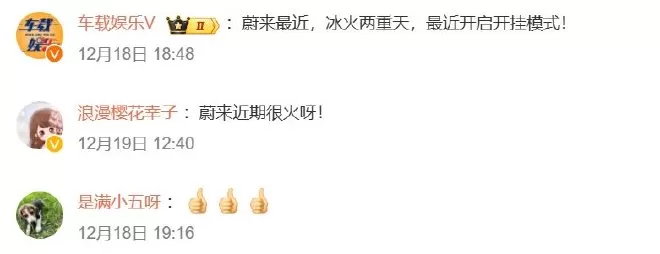
The operation of the capital market requires more courage and decisiveness. Some may say the overall environment is poor, but NIO has once again received strategic investment from CYVN. In the long run, NIO’s successful issuance of a total of $1.15 billion in convertible senior notes in September and October this year fully demonstrates that NIO has received continuous recognition from globally renowned strategic investors and public market investors. CYVN has invested in NIO twice this year, undoubtedly due to NIO’s outstanding performance in technology research and development. In the third quarter of this year, NIO’s research and development investment reached 3.04 billion yuan, surpassing 30 billion yuan for the fourth consecutive quarter. Over the past few years, NIO’s investment in research and development has approached 40 billion yuan, making it the enterprise with the highest research and development investment among new forces. Currently, NIO has established research and production facilities in Shanghai, Hefei, Beijing, Nanjing, San Jose, Munich, Oxford, and Singapore. As of the end of November this year, NIO has applied for and been granted approximately 7,700 patents globally. Considering the recent agreements NIO has signed with multiple car manufacturers for battery swapping services, it is clear that many more car manufacturers will enter this field in the future. NIO has also purchased some fixed production lines from JAC. Li Bin has once again shown strong confidence, emphasizing that NIO has recently completed a comprehensive plan for the company’s two-year operation, to determine key objectives, priorities, and action plans, as well as identifying opportunities for organizational optimization, cost reduction, and efficiency improvement. Next, NIO’s focus will be on optimizing product capabilities. With the arrival of funds from this new round of strategic investment, NIO’s cash reserves will be strengthened, providing strong support in the face of increasingly fierce competition in the future.